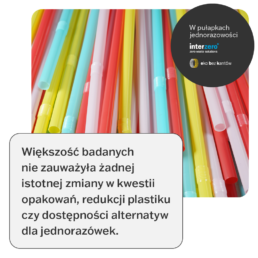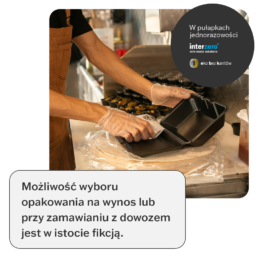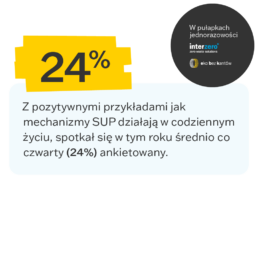The SUP Directive, or a Half-hearted Revolution
Even though the provisions of the SUP Directive have been in force in Poland for over a year and a half, most Poles have not noticed any significant change in terms of packaging, plastic reduction or the availability of alternatives to disposables - according to the latest data presented in the first part of the report "In the traps of disposableness", entitled "The curse of disposable plastic", prepared by Interzero.
The revolution has passed and few people have noticed it - this is how, in a few soldierly words, one could sum up the effects of the entry into force of the so-called Single-Use Plastics Act (hereinafter also referred to as the "SUP Act" - from Single-Use Plastic). Only 13% of respondents declared that they knew what the SUP directive was , what are its assumptions and goals, and what tools will be used to implement them. However, it is not about the awareness of Poles, but about the low effectiveness of the mechanisms implemented in Poland, which were supposed to help prevent waste and reuse products. One of them is the additional fee imposed on plastic packaging, effective from 1 January 2024, which was supposed to encourage us to use reusable packaging for drinks and food, similarly to plastic bags, which we have been paying for several years. The problem is that
that 42 percent of respondents never even noticed these additional fees . In contrast, as much as 56% systematically ignore them because they are usually so low in relation to the amount on the receipt (on average a few dozen groszy, the most - around PLN 2 per item), that they do not encourage giving up the convenience that the vast majority of respondents see in disposable packaging. "You don't have to wash them, return them to any point or restaurant, or carry them with you in case of spontaneous decisions to order a takeaway meal" - respondents also indicated during in-depth focus studies conducted independently by Opinia24.


Reusable - still few incentives
Unfortunately, from the perspective of respondents, offering an alternative type of packaging in catering establishments is also a fiction. It turns out that this obligation is implemented more in theory than in practice - the vast majority of respondents (79%) have never encountered the possibility of choosing a different, more ecological packaging in a restaurant or when ordering takeaway. Only one in four consumers has ever encountered information about a legally guaranteed (precisely under the SUP directive) alternative in the form of reusable packaging. This was confirmed directly by the respondents themselves - "Only the choice of cutlery, whether you want additional plastic. This is the only choice I have in the application. When I come and take away, no one asks me either. Or whether to give a bag or take it in your hand" - said one of the participants of the qualitative research. - "Usually there is no such option, it is simply one option available in a given place. For example, a "Chinese" has its own containers, a pizzeria - pizza cartons and no one asks if we want something else. I didn't have a choice," the second one chimed in. "[...] I'll be honest, since July 1, I've ordered many times, over 15 times or more, and no one either in the restaurant or over the phone has offered me anything like that," another respondent pointed out.
What do the packaging we throw away say about us?
In the first part of the report "In the traps of reusability", entitled "The curse of single-use plastic", we will also read a lot about the eating habits of Poles: what they order most often, where and how they place orders (by phone, apps, in person), what they pay attention to when looking at the packaging offered to them, and what they think about reusable packaging. And these are just some of the conclusions from the qualitative and quantitative studies that were to help diagnose and describe the state of implementation of the directive on single-use plastics in Poland. The qualitative studies included interviews with 24 people, the quantitative CAWI studies were conducted on a nationwide representative sample of 1,000 people. You can read the entire publication here: https://ekobezkantow.pl/raporty/w-pulapkach-jednorazowosci/

About Eco without edges
In 'Eco without corners' we talk about ecology without bending the truth. We deal with myths, fake news and half-truths. Our goal is to explain why waste should be segregated, not just how to do it properly. "Eko bez kantów" was created from the belief that in a world full of disinformation and greenwashing, a reliable source of reliable information is needed. We cover topics such as sustainable development, recycling, circular economy and legislation related to waste management. We discuss the impact of packaging, batteries and electro-waste on the environment, as well as ways to reuse them as valuable resources.
